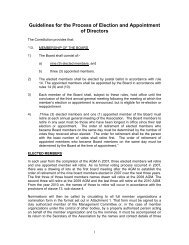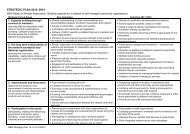November
Wintalyka November 2012 - Meals on Wheels
Wintalyka November 2012 - Meals on Wheels
- No tags were found...
You also want an ePaper? Increase the reach of your titles
YUMPU automatically turns print PDFs into web optimized ePapers that Google loves.
Wintalyka Issue 4 / 2012<br />
Feature story<br />
Training Snapshot - Responsibilities and<br />
Obligations of being a Director of a Not for Profit<br />
Organisation<br />
By Christine Russell (adapted from It’s Your Business ADHC)<br />
Being a Director on a Board or Management Committee is a legal responsibility that forms part<br />
of the corporate governance of an organisation. Governance is an essential component of a<br />
successful organisation.<br />
When you are invited or elected to become a Director, Board or Management Committee member<br />
this translates into providing leadership, undertaking risk management, monitoring and managing<br />
as well as looking at the sustainability of the organisation.<br />
There are legal responsibilities associated with being a Director, Board or Management Committee<br />
member which are called fiduciary duties. These relate to the duty to act honestly and competently<br />
and in the best interests of the organisation as well as to avoid and declare any conflicts of interest.<br />
The role of the Board is to know the business of the organisation and to set the directions for the<br />
future, to have a risk management plan, to establish reporting procedures and to develop long term<br />
financial and succession plans.<br />
For a Board to be effective it needs to suit the organisation in terms of skill set and to have a good<br />
relationship with staff and conduct effective meetings.<br />
A “skills based” Board should be reviewed on a regular basis so that the needs of the organisation<br />
are met and so that a suitable criteria is established for the recruitment of Board members.<br />
Office bearers are members that have specific responsibilities such as the Chairperson, Treasurer<br />
and Secretary.<br />
All Board members should receive induction and training.<br />
A Board should also undertake a collective regular assessment of its performance as well as that<br />
of individual Board members.<br />
The Board also conducts performance reviews for the senior manager of an organisation.<br />
Boards should monitor whether they are having productive meetings. The role and function of the<br />
Chairperson is to facilitate an effective meeting by encouraging all members to participate and to<br />
address all relevant issues.<br />
A Board provides the ethical framework for an organisation. The standards and practices of a<br />
Board filter from the top through to all persons in that organisation. Being a Board member is a<br />
very prized and responsible position that influences the culture, achievements and dynamics of an<br />
organisation through and through.<br />
nswmealsonwheels.org.au 55











